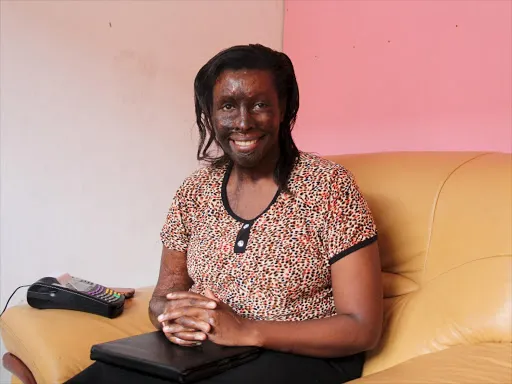
Gloria Kankunda
KAMPALA, Uganda—More than half her body is completely shriveled, but 33-year-old Gloria Kankunda is adamant about one thing. “I’ll make these scars stars,” Kankunda, who has a glowing smile to match her personality, told Take Part. She is one of the hundreds of women who have been left physically, psychologically, and socially scarred by an acid attack in the East African country in the past few decades.
Today, she is working to prevent further attacks as the managing director of Uganda’s Center for Rehabilitation of Survivors of Acid and Burns Violence, which she cofounded in 2012 to offer legal advice and health services to survivors. Late last year, the nongovernmental organization also succeeded in pushing through a bill that places restrictions on access to the chemicals and imposes a life sentence for someone convicted of perpetrating an acid attack. It was signed into law in December.
In Uganda, concentrated sulfuric acid, which can be obtained for less than a dollar at gas stations and street vendors, is a “weapon,” as Kankunda describes it, commonly used in premeditated attacks involving domestic disputes and land wrangles.
There were eight reported cases and two deaths from acid violence last year in the country, according to Acid Survivors’ Foundation Uganda, an NGO established in 2003 to prevent such assaults, although accurate statistics are hard to obtain and the real figures may be higher. There are at least 1,500 attacks each year worldwide, mainly in Southeast Asia, sub-Saharan Africa, the West Indies, and the Middle East, according to Acid Survivors Trust International, a charity partnering with organizations in Bangladesh, Cambodia, Pakistan, Nepal, India, and Uganda.
It was a “normal” night in 2009, Kankunda told TakePart. She had driven to her Kampala home with a friend after visiting family. “I was young, having a child and expecting another. Life was so good,” she said. But before Kankunda could get into her home safely, a stranger opened her car door and wrestled her out of the vehicle. “It’s unexplainable, like I was melting away,” she said, recalling how she felt. It wasn’t until Kankunda reached a hospital that a nurse told her acid had been used. She was left with burns on 70 percent of her body and blinded in one eye.
“I’d just read of one attack, but I had not seen a victim,” she said.
After a week in a Ugandan hospital, Kankunda was flown to South Africa, where she would spend two years recovering, leaving behind her family. After 20 skin-graft reconstructions, the survivor stopped counting the number of operations she’d had. In South Africa, Kankunda gave birth to a baby girl, but the delivery wasn’t without complications, and the pair nearly died. She also learned there that the man who attacked her had been hired by her husband’s “co-wife.” This did not surprise Kankunda, who says polygamy is “part of African culture.” “But I cannot imagine doing such a thing to anybody,” she said of her assault.
Because the main witness was unable to testify in a Ugandan court, the perpetrators were freed after just some months in jail. “I feel let down by the government,” said Kankunda.
She had always been “confident in my looks,” but when she returned to Uganda, the “reality of how I looked started to set in,” especially when out shopping or at church.
In 2012, she saw a TV report about another woman who was attacked by acid. Hanifa Nakiryowa had been left with facial scars and blinded in one eye after her ex-husband hired someone to attack the mother of two when she fled the abusive marriage. Kankunda tracked her down at the hospital. “I went looking for her. When I found her, she told me there were so many other victims. I was like, ‘Hanifa, let’s go and check on them,’ ” said Kankunda. The two set up the Center for Rehabilitation of Survivors of Acid and Burns Violence in Kankunda’s garage. Last year, an affiliate organization was established in the United States.
After the center’s Change.org petition garnered nearly 300,000 supporters, a bill restricting the use of chemicals for medical research, pharmaceutical, and other related purposes—and imposing life imprisonment for convictions—was signed into law by Uganda’s president in December.
The center, which is currently assisting about 25 women, has welcomed the law but is pushing for the act to be amended to specifically mention acid attacks and include provisions so that legal cases won’t be dismissed while witnesses recover. It also wants perpetrators to foot victims’ medical bills.
Linneti Kirungi, 24, endured burns to over a third of her body, with her ear severely damaged, after her boyfriend plotted an acid attack in 2012 when she refused to marry him. Kirungi, who is the center’s office administrator, said she had “gained courage” from Kankunda. “I was leaving my scars hidden, but now, when people ask what happened, I tell them,” she said.
Source: Meet the Inspiring Acid Attack Survivors Who Are Pushing to Change Uganda’s Laws | TakePart .
